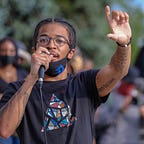When Tears Fall in January
Image Credit: Joseph Sherman/Instagram @ Shermyszn (2020)
January 26th was the first time I heard my homie cry. As he held back tears, whimpering as disbelief settled on his face like smoke after a crash, we sat in silence. Motionless. Only our doubts could be heard escaping the clenches of what we dared not utter. I was never taught to comfort another man when he cried; the brittle armor that patriarchal masculinity bound to the flesh of young boys made it difficult to do so. Rather, I was taught to tell them “man up!” as a source of manly medicine when pain and tears begin to reveal the cracks in our armor. I’ve seen the evolution of man into igneous rocks; a heat of pain and rage solidified by the words of our forefathers: “don’t be a pussy.” Two brothers silently cried as our phones faced the blank spaces of our ceilings and our hearts shattering to pieces like the helicopter Kobe cradled Gianna in.
It was the 9th wonder of the world — the high-flying dunks, jaw dropping shots and ballerina like footwork of Kobe being the 8th — seeing so many men violating gender norms and allowing themselves to feel something deeply. Feel something that was soul crushing. Feeling something other than anger that makes us destroy ourselves in fear of our masculinity being compromised. In our moment of agony, we admitted, even if only to one another, how fragile we truly are. I watched as the entire NBA — a league of men who pride themselves for being venomous competitors — shed tears on their battle field. For 24 seconds their heads carried the weight of cognitive dissonance; wanting to cry, but concerned that their tears would erode the hyper-masculinity shield they held up, exposing what truly lies beneath. They swayed left to right with their hands on their hips searching for answers. Feeling helpless.
Seeing these men — both common fans and athletes — fall into each others arms, sobbing, and being comforted with tender pats on the back as they shrunk left me astonished. We weren’t taught that. As men, we were taught by other broken men to be relentless and unforgiving; Mamba Mentality. But the death of our hero helped us with more than anything he did on the court. He helped us be vulnerable and gentle with one another. He helped us see each other as we truly were: lost boys who realized their deity was merely a human, but not realizing that that was the divine thing about Kobe.
We became committed to the flourishing of delicate girls into women of certainty, as not something to be threatened by, but something to be proud of embracing. Kobe proclaiming to be a “girl dad,” was a call to protect (not just from outside menaces, but from ourselves) and uplift girls and women, not only in words, but through our actions that could have real structural change. The type of structural change that does not hold women as the accountable party in a world that survives off their lifeblood: through both birth and violence. I remember in high-school I was clowned for watching the WNBA. My coach and teammates mocked me as I shared with them how I emulated Katie Smith, a sharp-shooter who played for the Detroit Shock, to better my jump shot. Kobe embraced the WNBA in a different way once he retired than he did when he played. The reason being, the inherited tenacity and mirroring basketball skills of his daughter, Gianna. She was determined to carry her fathers legacy as others looked for Kobe and his wife, Vanessa, to have a boy. “I got this!” Kobe enthusiastically describes Gianna saying. She seemed to change him for the better, which ultimately changed us.
Kobe brought us together, although through tragedy. His death allowed us to break our armor and expose our weaknesses. And realize, through the fighting of our tears, that our weaknesses were indeed strengths. He allowed us to re-think strength. We’re often taught about being strong, but what has being strong got us? What if we allowed ourselves to be soft? To be gentle? To be free and not congested with the thoughts of what a man should and should not be; exhausted from concealing our emotions, and ashamed of expressing the wrong ones. He allowed us to embrace being a “girl dad” as a way to challenge a structure — that we as men contribute to directly and indirectly — that diminishes women as people and renders them as objects that cursed us all through a serpent’s tongue. Kobe allowed us to be fragile and look at each other as we truly are.
In an era where being soft is tossed around as an insult, Kobe taught us being soft is what is needed to find our footing in an uncertain world. It is known around sports that iron sharpens iron: the best brings out the best in you. And that’s what Kobe did for us.
* Rest in Peace to John and Keri Altobelli and their daughter, Alyssa Altobelli. Sarah Chester and her daughter, Payton Chester. Christina Mauser, Kobe Bryant and Gianna Bryant. And Ara Zobayan.
